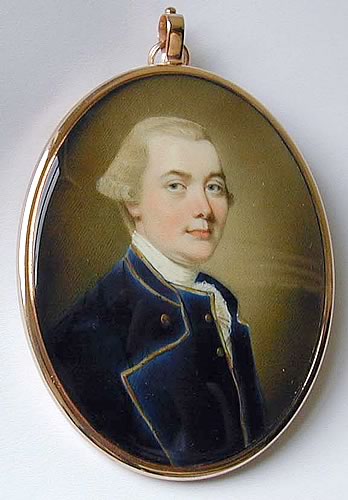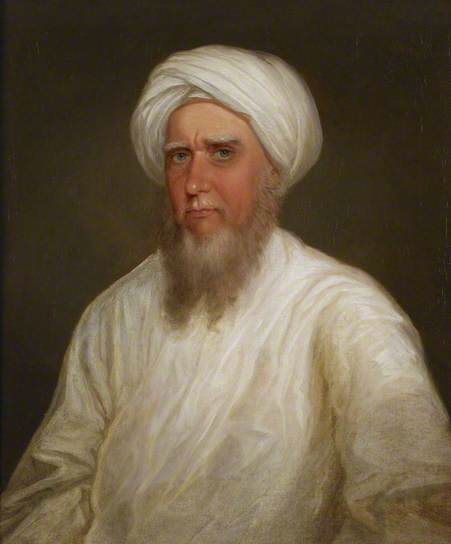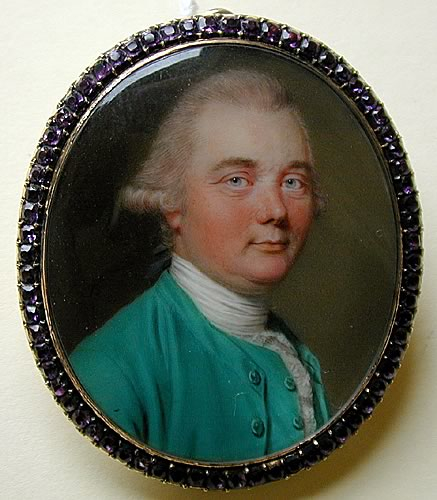|

Hugh Seton,
Baron of Touch and Tullibody, Hereditary Armour
Bearer to the King
When James Seton, last
direct Seton male of Touch, died in 1742 unmarried, his only sibling Elizabeth Seton inherited the
estate. She had married Hugh Smith, and by arrangement, he assumed his wife's surname
of Seton and continued the House of Touch and Tullibody.
Hugh held to the Touch family's Jacobite traditions and in
1745 Prince Charles Edward, on his way to the Battle of
Prestonpans stayed at Touch on the night of September 13th 1745.
He gave to his host Hugh Seton a quaich, a ring and a miniature
and General Murray left behind his dispatch book. These were much
treasured by the Setons, and are now held in the safekeeping of an
Edinburgh Museum. He cautiously avoided the horrific outcome
of the failed Jacobite rising of 1745-46 and retained his estate.
Hugh was a noted Master Freemason,
and was Master of the Lodge of Boulogne 1747-48 and the 13th Grand Master Mason
of the Grand Lodge of Scotland between 1748-49. Despite the
forfeiture of the Seton lands, after the failure of the Jacobite
risings, he maintained close ties with his chief, the 5th Earl of
Winton who he fled to Rome and who was there a member of
Chevalier's Cabinet, and it is through the Earl of Winton's
influence that he became Grand Master Mason of the Grand Lodge.
Hugh Seton maintained constant correspondence with the exiled Royal House of Stuart
throughout the 18th century, his letters in 1775 and 1776 to
Louise, Princess of Stolberg for
example, concerning the claim
of a young Lady (later legitimated the Duchess of Albany) to be
recognized as the daughter of the Young Pretender, have been
preserved. Despite his connections with House of Stuart, he
travelled extensively throughout Europe and made a personal
acquaintance and friendship with the near-relative of the House of
Hanover,
Adolphus Frederick IV, Duke of Mecklenburg-Strelitz,
as well as to have made connections with the later 1st President
of the United States of America, George Washington.
 A remarkable group of letters,
acquired by Queen Mary in 1933 with an old snuff-box which
formerly belonged to Hugh, provides a fascinating insight
into its history. It was a gift from Adolphus Frederick IV,
Duke of Mecklenburg-Strelitz, to Hugh Seton of Touch
(Stirlingshire) in April 1769. The Duke was the eldest
brother Queen Charlotte, wife of King George III . The Queen
corresponded regularly with ‘le cher duc’, although she was
constantly exasperated by her lack of success in persuading
him to marry. A remarkable group of letters,
acquired by Queen Mary in 1933 with an old snuff-box which
formerly belonged to Hugh, provides a fascinating insight
into its history. It was a gift from Adolphus Frederick IV,
Duke of Mecklenburg-Strelitz, to Hugh Seton of Touch
(Stirlingshire) in April 1769. The Duke was the eldest
brother Queen Charlotte, wife of King George III . The Queen
corresponded regularly with ‘le cher duc’, although she was
constantly exasperated by her lack of success in persuading
him to marry.
Hugh Seton, who like George
III was a keen agricultural reformer, had met the Duke the
previous September. He was entrusted with a number of
letters from the Duke to convey to his sister in England,
and on his arrival in England Seton wrote to the Duke to
confirm the safe delivery of the letters to the Queen at the
time of her confinement for the birth of Princess Augusta;
he added that he was sending the Duke a gift of a
post-chaise (four-wheeled carriage) as a mark of friendship.
The Duke was delighted with the present. In his reply he
thanked Seton for his generous gift, in which he drove out
daily, and begged him to accept this snuff box, ‘un petit paquet’, ‘wrapped in brown paper’, as a mark of his
friendship. The box was probably made in Germany by a French
workmaster. It is of superb quality and is elaborately
chased in vari-coloured gold with allegories of putti and
cherubs, emblematic of the arts and sciences. A miniature of
the Duke, by an unidentified German artist, is set into the
underside of the lid. It depicts the Duke wearing the star
and collar of Garter, which he had received in 1764.
 Later,
Hugh Seton, together with local lairds, brought families down from
the highlands to start the mammoth task of draining the Carse of
Stirling for land reclamation. Ditches were dug to float the peat which covered this
bogland down to the River Forth, and eventually out to sea. In all
an area some 60 square miles was reclaimed, and the rich clay soil
which was exposed beneath is now renowned for the production of
Timothy hay. Later,
Hugh Seton, together with local lairds, brought families down from
the highlands to start the mammoth task of draining the Carse of
Stirling for land reclamation. Ditches were dug to float the peat which covered this
bogland down to the River Forth, and eventually out to sea. In all
an area some 60 square miles was reclaimed, and the rich clay soil
which was exposed beneath is now renowned for the production of
Timothy hay.
This was only the start of Hugh Seton’s
improvements to Touch. It is to him that we owe the magnificent
south front which was commenced in 1757 and continued till 1770
when the Drawing Room ceiling was completed.
As a result of his
vast expenditures he found himself in considerable debt and left
to travel abroad and seek further fortunes in East India. His
portrait, painted in India by James Wales circa 1792–1794
shows Hugh Seton as a traveller wearing Eastern costume of a
white turban and gown, and there are interesting stories
abound from this period in his life.
His son and heir, Archibald, determined to clear the
estate of debt, joined the East India Company and sailed to India
in 1779. He rose to high office, accumulated a considerable sum of
money but sadly died on his way home at the age of 60 before reaching Touch, on
whose behalf he has worked all his life.
Archibald's sister, the heiress Barbara Seton, married Sir Henry Stuart of Allanton,
and inherited Touch. Sir Henry took the name of Seton-Steuart and
their family remained the lairds of Touch.
Sir Henry James Seton-Stewart,
Bart., of Touch House, was the eldest son of Sir Reginald
Macdonald Seton-Stewart, Bart., of Staffa, by Elizabeth, daughter
and heiress of Sir Henry Stewart, Bart, F.R.S., of Allanton. He
was born in 1812; succeeded, as third baronet, in 1838; and, in
1852, married Elizabeth, daughter of Robert Montgomery, Esquire.
Sir Henry was Hereditary Armour-Bearer and Squire of the Royal
Body in Scotland. The heir was his nephew, Alan Henry, elder son
of the late Archibald Seton-Stewart, Esquire, by Catherine,
daughter of Robert Stein, Esquire. He was born in 1856.
| 
